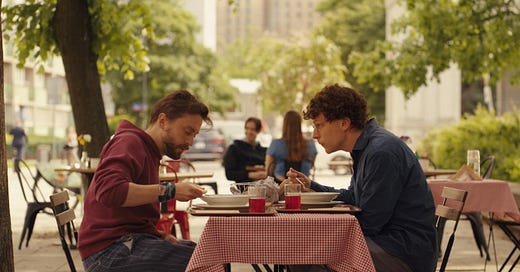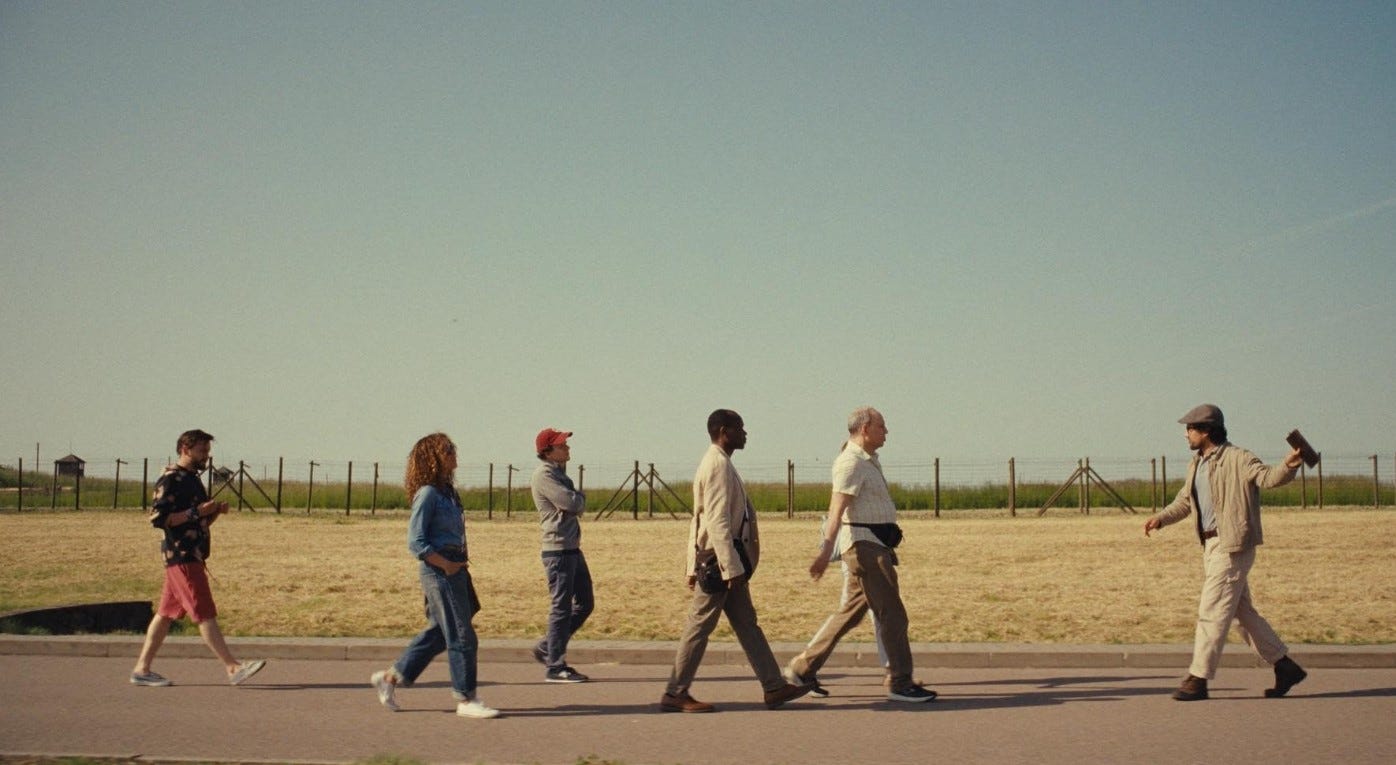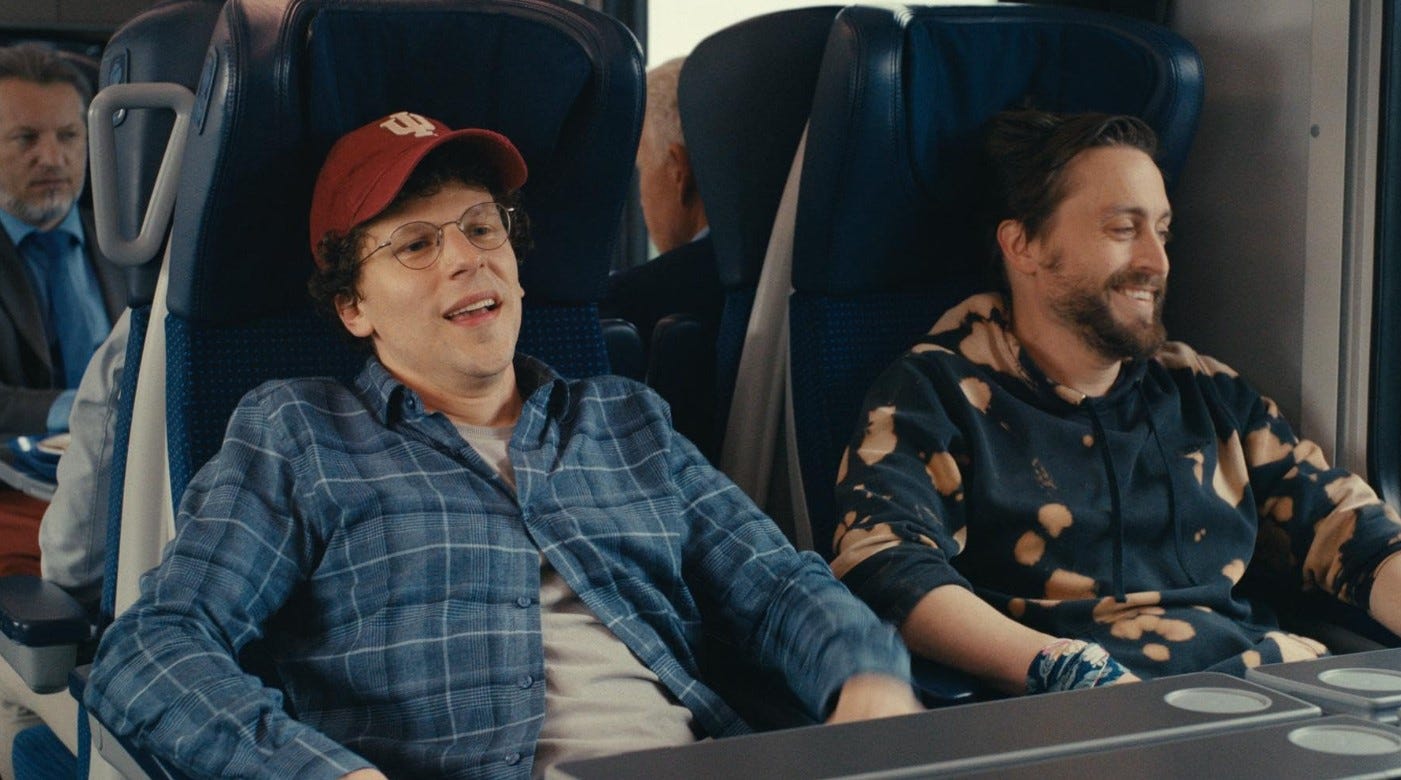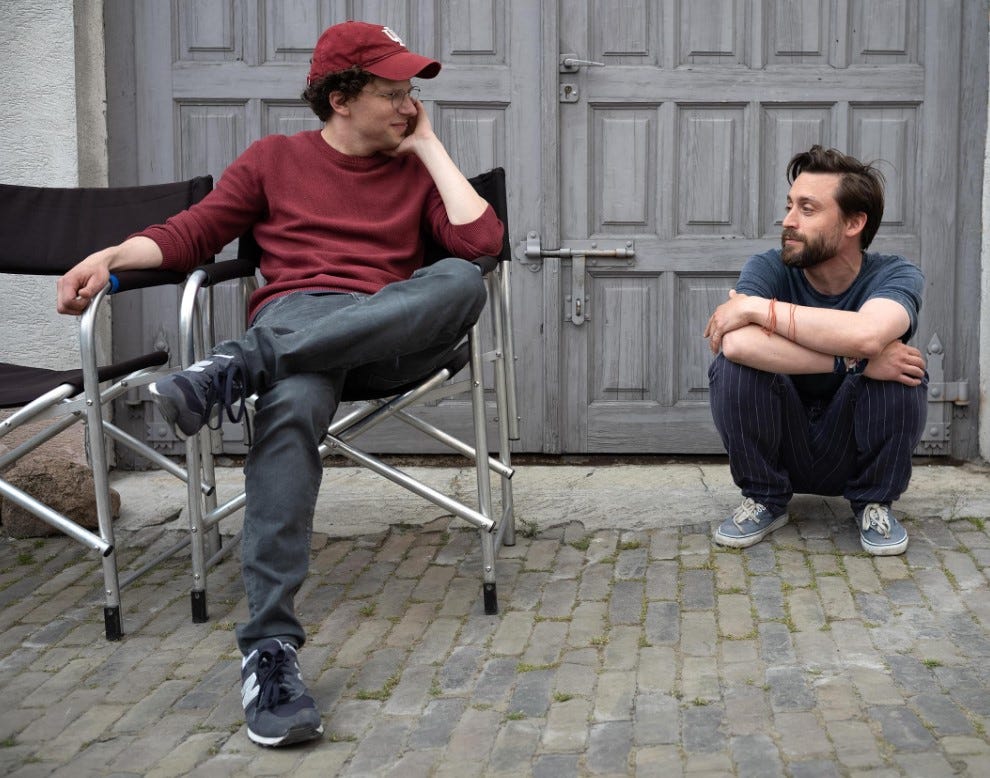My thoughts on A Real Pain and how it handles Poland and memory
Jesse Eisenberg calls A Real Pain a “love letter to Poland,” but watching it feels more like the tentative excitement after a promising first date.
After much anticipation, I finally got around to watching A Real Pain. It had been on my list for a while partly because I was curious about how Poland would be portrayed, but also because I knew the film was not a normal Holocaust film with a heavy message. So, I was expectying something different.
Director Jesse Eisenberg calls his film a "love letter to Poland," but that’s not quite what it feels like. It’s more like the positive feeling you get after a first date: something went well, there’s potential, and both sides agree to meet again.
Eisenberg’s personal connection to Poland made this even more intriguing – his maternal great-grandmother lived before the war in Krasnystaw, a small town in eastern Poland, and much of his extended family perished during the Holocaust. This deep-rooted history clearly influenced his approach to the film.
It’s a personal story, deeply rooted in family, grief, and the complicated bonds between two cousins, David and Benji
.
What struck me first was the way Eisenberg chose to frame Poland. The film’s cinematography gives a lot of love to Lublin, a city that comes across as vibrant and beautiful on screen. But let’s be clear: this isn’t a film about Poland. The portrayal feels disengaged, almost neutral. Eisenberg’s focus stays firmly on the cousins’ personal journeys rather than digging into Poland’s cultural or historical identity. And maybe that’s intentional. It’s a story about two Jewish Americans confronting their family’s past, not a deep dive into Polish history. That said, there’s a lot to unpack in how the country is represented.
David and Benji are the emotional core of the film. Their relationship is messy, filled with misunderstandings, arguments, and moments of reluctant connection. Eisenberg plays David, the introverted, slightly neurotic cousin who feels burdened by his mundane life. Opposite him is Kieran Culkin as Benji, a loud, emotionally volatile wildcard. The chemistry between them works because they’re so different yet tied by shared grief and family ties.
It’s through their clashing personalities that the film explores bigger themes of identity, inherited trauma, and the disconnect between remembering history and living it. The pair bicker and bond as they visit Holocaust sites, sometimes with shocking insensitivity, but always with a human honesty that’s both uncomfortable and compelling.
Eisenberg’s decision to depict a version of Poland shaped by his own past visit to the country gives the film a strange anachronistic quality. His trip in 2008 undoubtedly shaped his vision. Take the old Mercedes taxi that picks the cousins up from the airport, which feels like a relic from the past, but it’s also likely what Eisenberg remembers from his 2008 trip.
Similarly, the film leans heavily on images of communist-era architecture while avoiding Warsaw’s shiny new skyline of skyscrapers. It’s a choice that reinforces a sense of Poland as a place suspended between history and modernity, but it doesn’t do much to engage with the Poland of today.
Then there’s the notable absence of Polish voices in the story. Benji even complains at one point about not meeting any Polish people during the trip, which feels like a deliberate nod to the film’s narrow focus. The few Polish characters that do appear don’t come off well. Like the family who refuses to let the cousins leave remembrance stones at their grandmother’s old home. It’s moments like these that make the film feel more about the cousins’ alienation than any real engagement with Polish culture or society.
This film isn’t here to teach you about the Holocaust or Poland’s role in it, and that’s a refreshing change. There’s no spoon-fed history lesson, no over-explaining. It assumes you know the basics and lets the cousins’ reactions do the heavy lifting. That said, there’s a scene at Majdanek that really hit home for me. Having visited several Holocaust sites myself, I’ve often wondered what it feels like for Jewish and Polish visitors whose ancestrors perished at the hands of the Germans. The film captures that complexity of trying to connect with something impossibly vast and painful.
On the flip side, there’s a moment at the Warsaw Uprising Monument where the cousins are much more casual, even playful. For me, that felt wrong. The monument commemorates an act of extraordinary Polish suffering and resistance during World War II, and treating it so lightly seemed out of place. In contrast, the film handles the Monument to the Ghetto Heroes with far more care and respect, a juxtaposition that might have been intentional but still left me unsettled.
Kieran Culkin’s performance as Benji deserves special mention. He plays the emotionally messy cousin with a rawness that’s both infuriating and heartbreaking. Watching him meltdown on a Polish train, overwhelmed by the symbolism of Jews being transported to concentration camps on similar trains, is one of the most intense moments in the film. For American viewers less familiar with European train culture, this scene might seem exaggerated, but it works because of Culkin’s ability to make Benji’s pain feel real and immediate.
In the end, A Real Pain isn’t really about Poland, and it’s not exactly a Holocaust film either. It’s about two cousins trying, and often failing to connect, with the weight of history pressing down on them.
Eisenberg’s direction keeps the focus on the personal, and while that limits the film’s scope, it also makes it relatable and human. For all its flaws, the film succeeds in capturing something universal about grief, family, and the messy business of trying to understand where you come from.
It may not dive deep into Polish history, but A Real Pain is worth watching for its raw performances, sharp writing, and moments of surprising emotional resonance.
Eisenberg’s decision to apply for Polish citizenship in 2024 – a gesture to honour his heritage and as he said bridge Jewish-Polish relations – adds a poignant layer to the film’s underlying themes of connection and reconciliation. Just don’t go in expecting a love letter to Poland or a tidy moral about the past. This is a story about people, not places. Maybe that’s enough.
Poland Watch helps you stay informed, up-to-date, and ahead on Polish politics and current events. With in-depth analysis, behind-the-scenes insights, and clear explanations, we make sense of the strategies, trends, and stories shaping Poland today.
If you want to gain unique perspectives and cut through the noise, subscribe now and join a growing community of readers with a professional or personal interest in Poland’s political landscape.
👉 Subscribe today for free to get all future updates directly to your inbox.








